Rita's Story
Mum
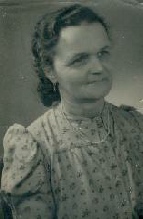 She was born on 29th February 1896 - a leap year baby. One of five children, two
boys and three girls. They lived in south-east Germany on the Czechoslovakian border
in a little hamlet called Mittelwalde. The oldest was Emma, then Franz, Marie, my
mother Agnes and Paul, the youngest.
She was born on 29th February 1896 - a leap year baby. One of five children, two
boys and three girls. They lived in south-east Germany on the Czechoslovakian border
in a little hamlet called Mittelwalde. The oldest was Emma, then Franz, Marie, my
mother Agnes and Paul, the youngest.
I was about ten years of age when I first visited my mother's birthplace. The main square had a large fountain surrounded by four of five small houses, two small shops and a police station with one officer whose main duty was to apprehend any illegal immigrants. The streets were covered with cobble stones. The village was surrounded by a forest, thick with pine trees and hills.
I had arrived by train from the nearest city: Breslau where I was born. The journey took one and a half hours. One of my mother's school-friends met me at the station with a horse and cart.
Coming from the city, I was truly happy to be for the first time in my life in such beautiful surroundings. The smell of pine trees is indescribable. I loved it. My grandfather was a train driver. He used to take the trains across the border into Czechoslovakia and back. I never met my grandparents. By the time my mother was 18 years old, both her parents had died so she moved to Breslau where she became a seamstress. Onkle Franz stayed in the country, but my mum's sisters Tante Emma and Tante Marie and Onkle Paul also came to Breslau.
After the first World War, she found the man of her dreams, married and settled down
to raise a family. Her first child, a son Erwin, was born in 1920. The second was
a girl but died as a baby. She had two more boys, Heinz in 1922 and 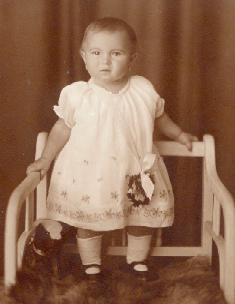 Günter in 1924,
then her husband left her for another woman.
Günter in 1924,
then her husband left her for another woman.
With three young children and no income, she was forced to accept state handouts. Every week she would queue up for her state benefit; her little boys by her side. A man 15 years her senior and also in the ranks of the poor and unemployed, took an interest in her. He was tall and handsome, and above all, he had a warm heart. My mum married him and had one more son, Georg born in 1926, then three daughters of which I was the first, born in 1928. My sister Ingeborg was born in 1931, followed by Christa in 1933.
We were all very happy. My mother and father were natural born parents. Not once did we children think of each other as half brothers or sisters. Our upbringing was strict. Rules and regulations had to be observed, presents very few, cleanliness a priority. We had food at meal-times, clean beds to sleep in, and mostly home-made clothing. Our parents were proud of us, especially when total strangers remarked how well behaved we all were.
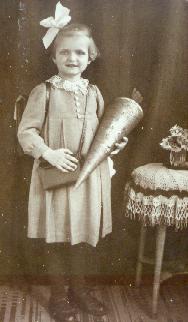 In 1933, tragedy struck once more. My father died as the result of a fall. I can
only imagine how my mother felt. Seven children; the eldest aged 13 and the youngest
just six months old with a lung infection, and at that time, in hospital. She could
not bring herself to go out to work for fear of neglecting the only treasure she
had - her children. Neither would she again accept the help of the state. Instead,
she took in sewing. She would sit by her machine day and night, leaning over it
to catch 40 winks when her eyes would not stay open any longer.
In 1933, tragedy struck once more. My father died as the result of a fall. I can
only imagine how my mother felt. Seven children; the eldest aged 13 and the youngest
just six months old with a lung infection, and at that time, in hospital. She could
not bring herself to go out to work for fear of neglecting the only treasure she
had - her children. Neither would she again accept the help of the state. Instead,
she took in sewing. She would sit by her machine day and night, leaning over it
to catch 40 winks when her eyes would not stay open any longer.
My mum was a good looking woman of slim build with dark, natural, wavy hair. We were expected to make our own beds, and at night, our clothing had to be folded neatly ready for the morning. She had a wooden spoon which kept us in order. It was very rarely used, but remembered a long time after!
Many suitors came with offers of marriage, but the memory of losing my father never left her. Also, she said she could never side with anybody against her own children if things should not work out.
After my father died, all except the youngest, were taken into a children's home to be looked after. The reason for this was so that my mother could look after my baby sister who was not well.
While we were in the home, the boys and the girls were divided by a large fence, although we could still see each other. My sister and I used to hold hands and stand by the fence watching our brothers play football. I remember one day, my mum's sister Tante Marie surrounded by my brothers. Inge and I watched her give them a bar of chocolate, and then she left. The boys came straight over to us and shared the chocolate with us.
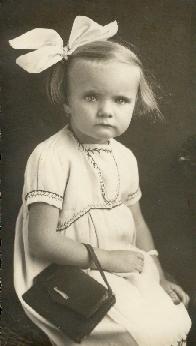 My mum was given a brand new flat in a council-owned house on the edge of the city,
and as each child became of school age, he or she could return home to live. When
my turn came at six years of age, my younger sister was still only four and too young
to go to school yet, but was allowed to come home as well because she would have
been the only one of us left. It was a half-hour tram ride from the children's home
to our new home in the outskirts of the city. As well as new homes being built,
there were new hospitals, schools roads, as well as the autobahn. We arrived at
our new home, looking at it with big eyes. There were our brothers, and my mum was
very happy to have all her children together again. This is my first memory of being
a family at home together. I loved being part of a large family. We spent some
wonderful days together . The two girls stayed at home with mum. They were brought
up proper little ladies , but I was allowed to go with the boys and turned into a
tomboy. We explored the area. My brothers were obsessed with sport: skiing, skating,
climbing, tobogonning, but most of all, swimming. Half an hour's ride by tram and
we were by the River Oder. I would be deposited on the bank with cake and buns and
given a stern warning not to move, while they practically flew into the water. They
would swim out to passing coal barges and climb until spotted, then they would jump
off and come swimming back. I was warned never to cry for any reason or my outings
with them would stop there and then. I never cried.
My mum was given a brand new flat in a council-owned house on the edge of the city,
and as each child became of school age, he or she could return home to live. When
my turn came at six years of age, my younger sister was still only four and too young
to go to school yet, but was allowed to come home as well because she would have
been the only one of us left. It was a half-hour tram ride from the children's home
to our new home in the outskirts of the city. As well as new homes being built,
there were new hospitals, schools roads, as well as the autobahn. We arrived at
our new home, looking at it with big eyes. There were our brothers, and my mum was
very happy to have all her children together again. This is my first memory of being
a family at home together. I loved being part of a large family. We spent some
wonderful days together . The two girls stayed at home with mum. They were brought
up proper little ladies , but I was allowed to go with the boys and turned into a
tomboy. We explored the area. My brothers were obsessed with sport: skiing, skating,
climbing, tobogonning, but most of all, swimming. Half an hour's ride by tram and
we were by the River Oder. I would be deposited on the bank with cake and buns and
given a stern warning not to move, while they practically flew into the water. They
would swim out to passing coal barges and climb until spotted, then they would jump
off and come swimming back. I was warned never to cry for any reason or my outings
with them would stop there and then. I never cried.
My eldest brother Erwin, left school just as I was starting my school years. He went into training as a waiter in the best hotel. Onkel Paul was the head waiter. That's how my brother got a helping hand. Erwin was earning money so he was made head of the family. We never dared to question his authority. At Christmas, he would dress up as St Nicholas. In the living room, he would prepare a hugh tree which he would buy in the market. Our Christmas is on 24th December. For the midday meal, we would have fish (carp), but our main meal in the evening was goose. We would all help with the cooking and the washing up, then dress in our best clothing and wait till we'd hear "Silent Night, Holy Night" playing in the other room where the tree was. Our hearts nearly stood still when the door opened. The room was in darkness except for the candles on the tree. The baubles and lametta gleamed, and the music brought an air of solemnity. Beneath the tree, were paper plates filled with gingerbread, nuts, shining red apples and sweets. The boys received gloves, a scarf, trouser belt, handkerchiefs, and the eldest received his first wallet. I had my first doll which, in later years, was handed down to my sisters - that was the rule. I was blissfully happy. My second eldest brother Heinz was leaving school now. He became a chimney sweep. He loved being at home best and was the biggest help to my mum. He was a very shy boy, but he could clean and cook as good as my mum. He would make sure of morning sticks, light the fire, and carry buckets of coal.
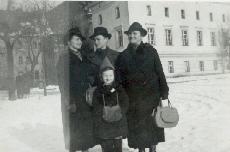 Günter, the third eldest, was ready to leave school. I remembered the art teacher
asking my mother about the possibility of my brother to enter art school, but I don't
know who decided anything. The outcome was a three year apprenticeship with a firm
of painter and decorators.
Günter, the third eldest, was ready to leave school. I remembered the art teacher
asking my mother about the possibility of my brother to enter art school, but I don't
know who decided anything. The outcome was a three year apprenticeship with a firm
of painter and decorators.
Mum felt great pity for him during the winter months when the weather was well below freezing and Günter was pushing a two-wheeler cart laden with ladders and paint-pots.
Our winters were really something, with thick, crunchy snow under our feet, and we would never touch the metal without gloves because our fingers would stick to it like glue. All the windows in our home were double windows, and in winter, only the inside windows were opened for fresh air. None of us children were ever ill. Not even once do I remember meeting a doctor.
Because it was such a long way for the boys to go to work every day, mum applied for somewhere to live that was nearer to the city centre. One day, she said I could go with her to see a new home. I liked the idea very much because it was in the centre of the city. We moved to our new home in 1936 and mum was very happy that the boys did not have so far to travel to work. Our new school was only about ten minutes' walk away.
The street on which we lived, was mainly all businesses. Shops, fishmongers, restaurants, butcher, baker etc. Four heavy horses would arrive pulling a cart with beer barrels to deliver to the restaurants.
We lived on the second floor of a large house right in the centre of the city. The wash-house and drying room was right at the top - four floors up. Every tenant would have to book the wash-house in advance. We would use it every three weeks for three days. The first day, Heinz would carry all the dirty clothes upstairs. Mum would sort them into different piles, then various vessels would be filled with water and the soaking process begun. Next morning very early, Heinz and mum would go upstairs to light the fire under the boiler for hot water, then they would string out the clothes line in the large drying room before coming down to make breakfast and getting us off to school. Mum would be up to her elbows in soap-suds, rubbing away on her washing board. Next day was the turn of the woollens, socks and trousers. She had a long wooden bench and often used to use that to scrub the trousers on it. The third day was for cleaning up. Everything had to be left clean and shining.
We would go every Sunday to the cemetery, to my grandparents' grave in the winter and in the summer we would go to the sports stadium. Everybody would bring a picnic and the children would be in their swimsuits and go in the swimming pool. One special day mum took us three girls to visit my father's grave. It was a very special day because the minister was there. I think mum was so proud of her children and wished their father could see them in their best clothes and on their best behaviour.
My mother's siblings married and had children except Tante Marie. Although she loved children, she could not have any, so we had the pleasure of her visits quite often. She lived close by and many times she would take one of us girls for a weekend to her house.
My mum would go shopping only once a week. Always on a Saturday morning. I used to love going with her to help carry the groceries, by mainly I was hoping for a little treat.
Mum wouldn't let me clean the home. She said I wouldn't do it good enough because I'd leave the corners untouched. She was very particular. Neither would she allow me to do the ironing. We couldn't afford a new one if I should drop it, but in my early teens, she introduced me to the cake baking. I loved it. Every Saturday I was busy making sponges, cheesecake, yeastcake or even poppy-seed cake which was very popular in our region. Almonds, cherries, nuts, vanilla and lemons were all goodies used for making cakes. The aroma was fantastic.
Erwin, the eldest had passed his examination as a hotel waiter just as conscription into the army came into force. He joined the Infantry. Heinz was called up for service in the Artillery. He cried, but go he must. When Günter was seventeen and passed his three years' training, he also joined up. Mum begged him not to go but he had set his heart on being in the Navy. He loved the sea. If he had waited for his call-up papers, then he would most likely have had to join the Infantry, and foot-slogging was not for him. He became a very proud sailor on a ship called The Köln.
Georg, the fourth eldest, became a furrier by trade and could sew beautifully. For his examination, he made a fur coat for a film star. His diploma said "Class A". For us girls, he made hand muffs. Mine was made of grey rabbit. It opened like a handbag with a zip pocket inside, and a mirror sewn into the flap. I was very proud.
Mum was working from dawn till well into the night. Inside her was a growing fear for her boys.
My mum in 1943
Me Aged 1 Year
My sister Ingeborg aged 6 Her first day at school
My sister Christa aged 3
R-L Mum, Günter, Marie and Christa c1940 in the Parade Square Wroclaw